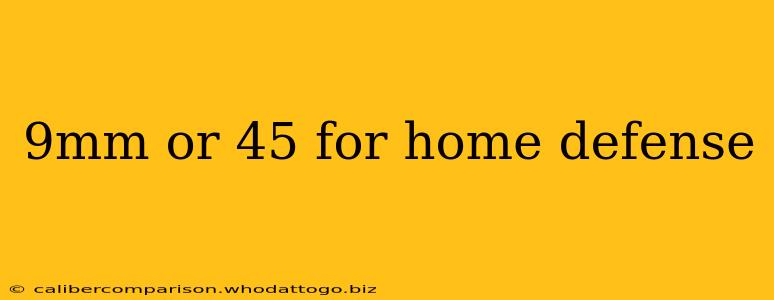Choosing a firearm for home defense is a deeply personal decision, and the caliber debate—specifically 9mm vs .45 ACP—is a frequent source of passionate discussion. There's no single "best" answer, as the ideal choice depends on individual factors like experience, physical capabilities, and personal preferences. This article dives deep into the key considerations to help you make an informed decision.
Ballistics: Power vs. Capacity
The core difference between 9mm and .45 ACP lies in their ballistics. .45 ACP rounds are significantly larger and heavier, delivering substantially more stopping power with a single shot. This increased energy transfer is often cited as a major advantage for home defense, potentially incapacitating a threat more quickly.
However, the 9mm cartridge offers a significant advantage in capacity. Most 9mm handguns hold considerably more rounds than their .45 ACP counterparts. In a high-stress home defense scenario where multiple shots might be necessary, this higher capacity can be crucial. The ability to quickly engage multiple threats without reloading is a substantial benefit.
Key Ballistic Considerations:
- Stopping Power: .45 ACP generally boasts higher stopping power due to its larger mass and energy transfer.
- Penetration: Both calibers offer sufficient penetration for home defense, but excessive penetration is a risk with either, depending on the specific ammunition used.
- Recoil: .45 ACP has noticeably stronger recoil, potentially impacting follow-up shot accuracy, especially for less experienced shooters. 9mm recoil is generally more manageable.
- Capacity: 9mm handguns typically hold significantly more rounds, providing a crucial advantage in extended engagements.
Accuracy and Control: A Matter of Practice
While raw power is a factor, accuracy and control are paramount in a home defense situation. A smaller, less powerful round placed accurately is far more effective than a more powerful round that misses the target. The manageable recoil of the 9mm often translates to better accuracy for many shooters, particularly under stress.
Consistent practice with your chosen firearm and ammunition is absolutely crucial to develop the necessary skills to accurately engage a threat, regardless of caliber.
Personal Factors: Experience and Physical Capabilities
Individual physical attributes significantly influence the choice between 9mm and .45 ACP. Shooters with smaller hands or less upper body strength might find the .45 ACP's recoil challenging to manage, impacting their accuracy and ability to quickly engage multiple targets. Conversely, those with more experience and upper body strength may find the .45 ACP manageable and prefer its stopping power.
Ammunition Availability and Cost: A Practical Consideration
The availability and cost of ammunition can also play a role in your decision. 9mm ammunition is generally more widely available and less expensive than .45 ACP, making it a more cost-effective choice for regular practice.
Conclusion: The Best Caliber is the One You Can Shoot Well
Ultimately, the "best" caliber for home defense—9mm or .45 ACP—comes down to individual factors and personal preferences. Both calibers are capable of effectively neutralizing a threat, but their distinct characteristics require careful consideration. Prioritize choosing a firearm that you can handle comfortably, shoot accurately, and consistently practice with. The ability to accurately place shots under stress is far more critical than the caliber itself. Consult with experienced firearms instructors and professionals to make the most informed decision for your specific needs and circumstances.

